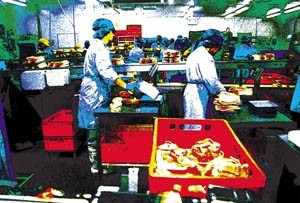Increased UK M&A activity sees plcs sell off 'peripheral' businesses
Earlier in the year, corporate finance partner Julian Wild told FoodManfuacture.co.uk that UK deals were “pretty thin on the ground”, due to the unwillingness of banks to lend, which had depressed deal values and meant there was little on the market.
However, given that UK market share, especially amongst the major players, remained pretty stagnant, Wild said that acquisitions were the only real growth option, since selling more products and winning new customers was difficult.
Accordingly, Wild believes activity has increased: “In the UK we’re looking at selective deals involving branded businesses, and although the climate isn’t changing dramatically, I do sense we’re moving into more positive phase. Especially compared to around two years ago when times were particularly bleak.
“There is a lot going on in an international context, involving multinationals, although not necessarily in the UK, since relative consolidation means we don’t have as attractive deals to make here.”
Dalepak sale
Wild advised Northern Foods over the £6.4m cash sale of North Yorkshire-based Dalepak to Irish Food Processors Group in August, and he said Rollits had helped to negotiate half a dozen deals already this year:
“There seems to be an increased focus on plcs, which are looking at their activities that might perhaps be regarded as peripheral and selling them off – rather than small companies being snapped-up.”
“We’re pretty active here – with a number of things in the pipline – and business is certainly looking-up compared to this time last year.”
Following Finnish firm Raisio’s acquisition of Glisten, Wild said in April that it would be interesting to see if there was renewed interested in other AIM-listed companies such as Finsbury and Zetar.
However, he said that the “market appetite” for AIM-listed businesses was lacking, which “maybe contributed” to Glisten’s decision to come off the market in the UK and sell abroad in the first place, prompted by the need for equity.
“Finsbury Food Group is maybe similar – because of debt levels it will struggle to continue making acquisitions. Zetar on the other hand is doing pretty well.”
United Biscuits
Asked about potential buyers for United Biscuits, Wild said that it was hard to conceive anything other than a “major international trade buyer”, given that several private equity firms already held stakes in the biscuit giant.
“I can’t see it being sold as a single entity, but split between its biscuit and snack arms. This will make the sale process much more straightforward.”
In July United Biscuits’ private equity owners Blackstone and PAI Partners put United Biscuirts up for sale, and media reports in late August suggested that Campbell Soup Company was considering bidding for the biscuit-making arm of United Biscuits, which includes brands such as Penguin, Jaffa Cakes and HobNobs.
Wild said that Campbell was a good potential fit: “It’s a definite possibility and Campbell may well be a candidate, after all, it's only got the same pension issues as everyone else.”
Phil Jackson from Grant Thornton said the widely touted price of around £2bn for United Biscuits was fair and that the buyer could either be trade or private equity; he added that debt levels “are certainly not unsustainable in the current climate.”
He added: “In terms of differentiating for sale purposes, perhaps there is a little more value in the in the snack brands. I think PepsiCo might run into competition problems, while Kraft is probably spent-out for the time being [after acquiring Cadbury].”













